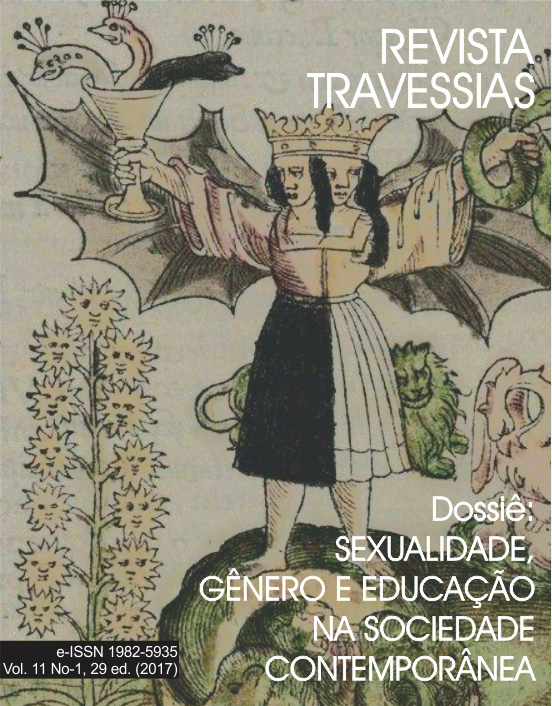Critical formation in english teaching: reflexions about practicum
Keywords:
Ensino de inglês, formação crítica, estágio.Abstract
This paper presents the analysis of five didactic sequences developed in the Practicum – during my Letras (Língua Inglesa e Literaturas) course at Universidade do Estado da Bahia (UNEB) in 2014 – in a critical perspective. The aim is to reflect how the proposed activities contributed for a critical formation of the learners as well as to suggest other methodological paths in English teaching. Thus, this work is a bibliography research whereby I used the theoretical categories worked by authors in Education and in the Linguistic area. Also, this work is a documental research whereby I promoted analytical treatment to the didactic sequences based on the theoretical framework. The results pointed out that: 1) the activities developed in the Practicum presented a social function, and therefore, a critical perspective. However, there are remnants of Traditional Pedagogy; 2) English teachers have problems in proposing meaningful activities for learners, and; 3) it is important to approximate the discourses and practices between university and school to build on effective educational critical practices.
Downloads
References
BAILEY, Kathleen. Reflective Pedagogy. In: BURNS, Anne; RICHARDS, Jack. C. Pedagogy and practice in second language teaching. 2012. p. 23-29.
BARTLETT, Leo. Teacher development through reflective teaching. In: RICHARDS, Jack C.; NUNAN, David. (Eds.). Second language teacher education. New York: Cambridge University Press, 1990. p. 202-214.
BRASIL. Orientação Curriculares para o Ensino Médio: Linguagens, códigos e suas tecnologias / Secretaria de Educação Básica. – Brasília: Ministério da Educação, Secretaria de Educação Básica, Volume 1, 2006, 239 p.
BEZEMER, Jeff; KRESS, Guther. Visualizing English: a social semiotic history of a school subject. SAGE Publications, v. 8, n. 3, p. 247-262, 2009
CALVINO, Italo. Por que ler os clássicos. 1ed. SP: Companhia das Letras, 2007.
COPE, Bill; KALANTZIS, Mary. Multiliteracies: new literacies, new learning. Pedagogies: An International Jornal, v. 4, p. 164-195, 2009.
COSSON, Rildo. Letramento literário: teoria e prática. São Paulo: Contexto, 2014.
COSTA, Marta Morais da. Sempreviva, a leitura. Curitiba: Aymará, 2009.
COX, Maria Inês. P.; ASSIS-PETERSON, Ana Antônia. Critical Pedagogy in ELT: images of Brazilian teachers of English. TESOL Quarterly, v. 33, n.3, p. 433-452, 1999.
DALVI, Maria Amélia. Literatura na escola: propostas didático-metodológicas. In: DALVI, Maria Amélia et. al. (Org.) Leitura de literatura na escola. São Paulo, SP: Parábola, 2013. p. 118-143.
FRANSON, Charlotte; HOLLIDAY, Adrian. Social and cultural perspectives. The scope of second language teacher education. In: BURNS, Anne; RICHARDS, Jack C. The Cambridge guide to second language teacher education. Cambridge: CUP. 2009. p. 40-49
FREIRE, Paulo. Pedagogia do oprimido. Rio de Janeiro: Paz e Terra, 2005.
_____. A importância do ato de ler: em três artigos que se completam. 51. ed. São Paulo: Cortez, 2011.
GADOTTI, Moacir. Convite à leitura de Paulo Freire. São Paulo: Editora Scipione, 1989.
GREGGIO, Saionara; GIL, Glória. O conceito de professor reflexivo na formação de professores. In: BARROS, Solange Maria de; ASSIS-PETERSON, Maria Antônia de (Orgs.). Formação crítica de professores de línguas: Desejos e possibilidades. 2010. p. 55-68.
HAWKINS, Margaret; NORTON, Bonny. Critical Language Teacher Education. In: BURNS, Anne; RICHARDS, Jack C. The Cambridge Guide to Second Language Teacher Education. Cambridge: CUP. 2009. p. 30-39.
JORGE, Míriam Lúcia dos Santos. Novas perspectivas na formação de professores de inglês: a formação do profissional reflexivo. TELA (Textos em Linguística Aplicada) [CD-ROM]. Pelotas: Educat, 2003.
KRAMSCH, Claire. Language and culture. Oxford University Press, 1998.
ROJO, Roxane. Letramentos múltiplos, escola e inclusão social. São Paulo: Parábola editorial, 2009.
SAVIANI, Dermeval. Escola e democracia. 36. ed. Campinas, SP: Autores Assossiados, 2003.
_____. Pedagogia histórico-crítica. 11. ed. Campinas, SP: Autores Assossiados, 2013.
SCHÖN, Donald. The crisis of confidence in Professional knowledge. In: SCHÖN, Donald. The reflective practitioner. London: Temple Smith, 1983, p. 3-68.
SEVERINO, Antônio Joaquim. Metodologia do trabalho científico. 23. ed. São Paulo: Cortez, 2007.
SOARES, Magda. Letramento: um tema em três gêneros. 3. ed. Belo Horizonte: Autêntica Editora, 2011.
STEIN, Pippa. Rethinking Resources: Multimodal Pedagogies in the ESL classroom. TESOL Quarterly v. 34, n.2, p. 333-340, 2000.
UNSWORTH, Len. Teaching multiliteracies across the curriculum. Philadelphia, USA: Open University Press, 2001.
ZEICHNER, Kenneth. M.; LISTON, Daniel P. Teaching Student Teachers to Reflect. Harvard educational review, v. 57, n.1, p. 23-48, 1987.
ZEICHNER, Kenneth. M. Educating reflective teachers for learner-centered education: possibilities and contradictions. In: GIMENEZ, Telma (Org.). Ensinando e aprendendo inglês na universidade: formação de professores em tempos de mudança. Londrina: ABRAPUI. 2003. p. 3-19.
Downloads
Published
How to Cite
Issue
Section
License
Creative Copyright Notice
Policy for Free Access Journals
Authors who publish in this journal agree to the following terms:
1. Authors keep the copyright and grant the journal the right of first publication, with the work simultaneously licensed under the Creative Commons Attribution License, which allows sharing the trial with acknowledgment of authorship and initial publication in this journal.
2. Authors are authorized to take additional contracts separately, for non-exclusive distribution of the work version, published in this journal (eg publish in institutional repository or as a book chapter), with acknowledgment of authorship and initial publication in this journal.
3. Authors are allowed and encouraged to publish and distribute their work online (eg in institutional repositories or on their personal page) at any point before or during the editorial process, as this can generate productive changes, as well as increase both impact and citation of the published trial (See The Effect of Free Access).
Creative Commons License
This work is licensed under a Creative Commons Attribution–NonCommercial-shareaswell 4.0 International License, which allows you to share, copy, distribute, display, reproduce, completely or part of the work, since there is no commercial purpose, and authors and source are cited.



